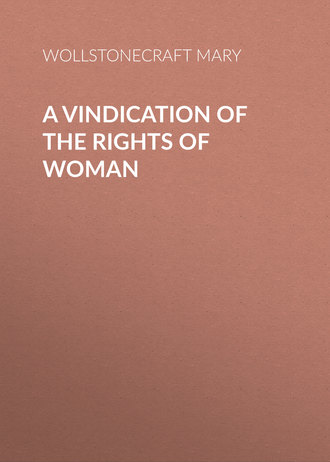 полная версия
полная версияA Vindication of the Rights of Woman
Children, he truly observes, form a much more permanent connexion between married people than love. Beauty he declares will not be valued, or even seen, after a couple have lived six months together; artificial graces and coquetry will likewise pall on the senses: why then does he say, that a girl should be educated for her husband with the same care as for an eastern haram?
I now appeal from the reveries of fancy and refined licentiousness to the good sense of mankind, whether, if the object of education be to prepare women to become chaste wives and sensible mothers, the method so plausibly recommended in the foregoing sketch, be the one best calculated to produce those ends? Will it be allowed that the surest way to make a wife chaste, is to teach her to practise the wanton arts of a mistress, termed virtuous coquetry by the sensualist who can no longer relish the artless charms of sincerity, or taste the pleasure arising from a tender intimacy, when confidence is unchecked by suspicion, and rendered interesting by sense?
The man who can be contented to live with a pretty useful companion without a mind, has lost in voluptuous gratifications a taste for more refined enjoyments; he has never felt the calm satisfaction that refreshes the parched heart, like the silent dew of heaven—of being beloved by one who could understand him. In the society of his wife he is still alone, unless when the man is sunk in the brute. "The charm of life," says a grave philosophical reasoner, is "sympathy; nothing pleases us more than to observe in other men a fellow-feeling with all the emotions of our own breast."
But, according to the tenor of reasoning by which women are kept from the tree of knowledge, the important years of youth, the usefulness of age, and the rational hopes of futurity, are all to be sacrificed, to render woman an object of desire for a short time. Besides, how could Rousseau expect them to be virtuous and constant when reason is neither allowed to be the foundation of their virtue, nor truth the object of their inquiries?
But all Rousseau's errors in reasoning arose from sensibility, and sensibility to their charms women are very ready to forgive! When he should have reasoned he became impassioned, and reflection inflamed his imagination, instead of enlightening his understanding. Even his virtues also led him farther astray; for, born with a warm constitution and lively fancy, nature carried him toward the other sex with such eager fondness, that he soon became lascivious. Had he given way to these desires, the fire would have extinguished itself in a natural manner, but virtue, and a romantic kind of delicacy, made him practise self-denial; yet, when fear, delicacy, or virtue restrained him, he debauched his imagination; and reflecting on the sensations to which fancy gave force, he traced them in the most glowing colours, and sunk them deep into his soul.
He then sought for solitude, not to sleep with the man of nature; or calmly investigate the causes of things under the shade where Sir Isaac Newton indulged contemplation, but merely to indulge his feelings. And so warmly has he painted what he forcibly felt, that, interesting the heart and inflaming the imagination of his readers; in proportion to the strength of their fancy, they imagine that their understanding is convinced, when they only sympathize with a poetic writer, who skilfully exhibits the objects of sense, most voluptuously shadowed, or gracefully veiled; and thus making us feel, whilst dreaming that we reason, erroneous conclusions are left in the mind.
Why was Rousseau's life divided between ecstasy and misery? Can any other answer be given than this, that the effervescence of his imagination produced both; but, had his fancy been allowed to cool, it is possible that he might have acquired more strength of mind. Still, if the purpose of life be to educate the intellectual part of man, all with respect to him was right; yet, had not death led to a nobler scene of action, it is probable that he would have enjoyed more equal happiness on earth, and have felt the calm sensations of the man of nature, instead of being prepared for another stage of existence by nourishing the passions which agitate the civilized man.
But peace to his manes! I war not with his ashes, but his opinions. I war only with the sensibility that led him to degrade woman by making her the slave of love.
…."Curs'd vassalage,First idoliz'd till love's hot fire be o'er,Then slaves to those who courted us before."Dryden.The pernicious tendency of those books, in which the writers insidiously degrade the sex, whilst they are prostrate before their personal charms, cannot be too often or too severely exposed.
Let us, my dear contemporaries, arise above such narrow prejudices! If wisdom is desirable on its own account, if virtue, to deserve the name, must be founded on knowledge; let us endeavour to strengthen our minds by reflection, till our heads become a balance for our hearts; let us not confine all our thoughts to the petty occurrences of the day, nor our knowledge to an acquaintance with our lovers' or husbands' hearts; but let the practice of every duty be subordinate to the grand one of improving our minds, and preparing our affections for a more exalted state!
Beware then, my friends, of suffering the heart to be moved by every trivial incident: the reed is shaken by a breeze, and annually dies, but the oak stands firm, and for ages braves the storm.
Were we, indeed, only created to flutter our hour out and die—why let us then indulge sensibility, and laugh at the severity of reason. Yet, alas! even then we should want strength of body and mind, and life would be lost in feverish pleasures or wearisome languor.
But the system of education, which I earnestly wish to see exploded, seems to presuppose, what ought never to be taken for granted, that virtue shields us from the casualties of life; and that fortune, slipping off her bandage, will smile on a well-educated female, and bring in her hand an Emilius or a Telemachus. Whilst, on the contrary, the reward which virtue promises to her votaries is confined, it is clear, to their own bosoms; and often must they contend with the most vexatious worldly cares, and bear with the vices and humours of relations for whom they can never feel a friendship.
There have been many women in the world who, instead of being supported by the reason and virtue of their fathers and brothers, have strengthened their own minds by struggling with their vices and follies; yet have never met with a hero, in the shape of a husband; who, paying the debt that mankind owed them, might chance to bring back their reason to its natural dependent state, and restore the usurped prerogative, of rising above opinion, to man.
SECTION 5.2
Dr. Fordyce's sermons have long made a part of a young woman's library; nay, girls at school are allowed to read them; but I should instantly dismiss them from my pupil's, if I wished to strengthen her understanding, by leading her to form sound principles on a broad basis; or, were I only anxious to cultivate her taste; though they must be allowed to contain many sensible observations.
Dr. Fordyce may have had a very laudable end in view; but these discourses are written in such an affected style, that were it only on that account, and had I nothing to object against his MELLIFLUOUS precepts, I should not allow girls to peruse them, unless I designed to hunt every spark of nature out of their composition, melting every human quality into female weakness and artificial grace. I say artificial, for true grace arises from some kind of independence of mind.
Children, careless of pleasing, and only anxious to amuse themselves, are often very graceful; and the nobility who have mostly lived with inferiors, and always had the command of money, acquire a graceful ease of deportment, which should rather be termed habitual grace of body, than that superiour gracefulness which is truly the expression of the mind. This mental grace, not noticed by vulgar eyes, often flashes across a rough countenance, and irradiating every feature, shows simplicity and independence of mind. It is then we read characters of immortality in the eye, and see the soul in every gesture, though when at rest, neither the face nor limbs may have much beauty to recommend them; or the behaviour, any thing peculiar to attract universal attention. The mass of mankind, however, look for more TANGIBLE beauty; yet simplicity is, in general, admired, when people do not consider what they admire; and can there be simplicity without sincerity? but, to have done with remarks that are in some measure desultory, though naturally excited by the subject.
In declamatory periods Dr. Fordyce spins out Rousseau's eloquence; and in most sentimental rant, details his opinions respecting the female character, and the behaviour which woman ought to assume to render her lovely.
He shall speak for himself, for thus he makes nature address man. "Behold these smiling innocents, whom I have graced with my fairest gifts, and committed to your protection; behold them with love and respect; treat them with tenderness and honour. They are timid and want to be defended. They are frail; O do not take advantage of their weakness! Let their fears and blushes endear them. Let their confidence in you never be abused. But is it possible, that any of you can be such barbarians, so supremely wicked, as to abuse it? Can you find in your hearts3 to despoil the gentle, trusting creatures of their treasure, or do any thing to strip them of their native robe of virtue? Curst be the impious hand that would dare to violate the unblemished form of Chastity! Thou wretch! thou ruffian! forbear; nor venture to provoke heaven's fiercest vengeance." I know not any comment that can be made seriously on this curious passage, and I could produce many similar ones; and some, so very sentimental, that I have heard rational men use the word indecent, when they mentioned them with disgust.
Throughout there is a display of cold, artificial feelings, and that parade of sensibility which boys and girls should be taught to despise as the sure mark of a little vain mind. Florid appeals are made to heaven, and to the BEAUTEOUS INNOCENTS, the fairest images of heaven here below, whilst sober sense is left far behind. This is not the language of the heart, nor will it ever reach it, though the ear may be tickled.
I shall be told, perhaps, that the public have been pleased with these volumes. True—and Hervey's Meditations are still read, though he equally sinned against sense and taste.
I particularly object to the lover-like phrases of pumped up passion, which are every where interspersed. If women be ever allowed to walk without leading-strings, why must they be cajoled into virtue by artful flattery and sexual compliments? Speak to them the language of truth and soberness, and away with the lullaby strains of condescending endearment! Let them be taught to respect themselves as rational creatures, and not led to have a passion for their own insipid persons. It moves my gall to hear a preacher descanting on dress and needle-work; and still more, to hear him address the 'British fair, the fairest of the fair', as if they had only feelings.
Even recommending piety he uses the following argument. "Never, perhaps, does a fine woman strike more deeply, than when, composed into pious recollection, and possessed with the noblest considerations, she assumes, without knowing it, superiour dignity and new graces; so that the beauties of holiness seem to radiate about her, and the by-standers are almost induced to fancy her already worshipping amongst her kindred angels!" Why are women to be thus bred up with a desire of conquest? the very epithet, used in this sense, gives me a sickly qualm! Does religion and virtue offer no stronger motives, no brighter reward? Must they always be debased by being made to consider the sex of their companions? Must they be taught always to be pleasing? And when levelling their small artillery at the heart of man, is it necessary to tell them that a little sense is sufficient to render their attention INCREDIBLY SOOTHING? "As a small degree of knowledge entertains in a woman, so from a woman, though for a different reason, a small expression of kindness delights, particularly if she have beauty!" I should have supposed for the same reason.
Why are girls to be told that they resemble angels; but to sink them below women? Or, that a gentle, innocent female is an object that comes nearer to the idea which we have formed of angels than any other. Yet they are told, at the same time, that they are only like angels when they are young and beautiful; consequently, it is their persons, not their virtues, that procure them this homage.
Idle empty words! what can such delusive flattery lead to, but vanity and folly? The lover, it is true, has a poetic licence to exalt his mistress; his reason is the bubble of his passion, and he does not utter a falsehood when he borrows the language of adoration. His imagination may raise the idol of his heart, unblamed, above humanity; and happy would it be for women, if they were only flattered by the men who loved them; I mean, who love the individual, not the sex; but should a grave preacher interlard his discourses with such fooleries?
In sermons or novels, however, voluptuousness is always true to its text. Men are allowed by moralists to cultivate, as nature directs, different qualities, and assume the different characters, that the same passions, modified almost to infinity, give to each individual. A virtuous man may have a choleric or a sanguine constitution, be gay or grave, unreproved; be firm till be is almost over-bearing, or, weakly submissive, have no will or opinion of his own; but all women are to be levelled, by meekness and docility, into one character of yielding softness and gentle compliance.
I will use the preacher's own words. "Let it be observed, that in your sex manly exercises are never graceful; that in them a tone and figure, as well as an air and deportment, of the masculine kind, are always forbidding; and that men of sensibility desire in every woman soft features, and a flowing voice, a form not robust, and demeanour delicate and gentle."
Is not the following portrait—the portrait of a house slave? "I am astonished at the folly of many women, who are still reproaching their husbands for leaving them alone, for preferring this or that company to theirs, for treating them with this and the other mark of disregard or indifference; when, to speak the truth, they have themselves in a great measure to blame. Not that I would justify the men in any thing wrong on their part. But had you behaved to them with more RESPECTFUL OBSERVANCE, and a more EQUAL TENDERNESS; STUDYING THEIR HUMOURS, OVERLOOKING THEIR MISTAKES, SUBMITTING TO THEIR OPINIONS in matters indifferent, passing by little instances of unevenness, caprice, or passion, giving SOFT answers to hasty words, complaining as seldom as possible, and making it your daily care to relieve their anxieties and prevent their wishes, to enliven the hour of dulness, and call up the ideas of felicity: had you pursued this conduct, I doubt not but you would have maintained and even increased their esteem, so far as to have secured every degree of influence that could conduce to their virtue, or your mutual satisfaction; and your house might at this day have been the abode of domestic bliss." Such a woman ought to be an angel—or she is an ass—for I discern not a trace of the human character, neither reason nor passion in this domestic drudge, whose being is absorbed in that of a tyrant's.
Still Dr. Fordyce must have very little acquaintance with the human heart, if he really supposed that such conduct would bring back wandering love, instead of exciting contempt. No, beauty, gentleness, etc. etc. may gain a heart; but esteem, the only lasting affection, can alone be obtained by virtue supported by reason. It is respect for the understanding that keeps alive tenderness for the person.
As these volumes are so frequently put into the hands of young people, I have taken more notice of them than strictly speaking, they deserve; but as they have contributed to vitiate the taste, and enervate the understanding of many of my fellow-creatures, I could not pass them silently over.
SECTION 5.3
Such paternal solicitude pervades Dr. Gregory's Legacy to his daughters, that I enter on the task of criticism with affectionate respect; but as this little volume has many attractions to recommend it to the notice of the most respectable part of my sex, I cannot silently pass over arguments that so speciously support opinions which, I think, have had the most baneful effect on the morals and manners of the female world.
His easy familiar style is particularly suited to the tenor of his advice, and the melancholy tenderness which his respect for the memory of a beloved wife diffuses through the whole work, renders it very interesting; yet there is a degree of concise elegance conspicuous in many passages, that disturbs this sympathy; and we pop on the author, when we only expected to meet the—father.
Besides, having two objects in view, he seldom adhered steadily to either; for, wishing to make his daughters amiable, and fearing lest unhappiness should only be the consequence, of instilling sentiments, that might draw them out of the track of common life, without enabling them to act with consonant independence and dignity, he checks the natural flow of his thoughts, and neither advises one thing nor the other.
In the preface he tells them a mournful truth, "that they will hear, at least once in their lives, the genuine sentiments of a man, who has no interest in deceiving them."
Hapless woman! what can be expected from thee, when the beings on whom thou art said naturally to depend for reason and support, have all an interest in deceiving thee! This is the root of the evil that has shed a corroding mildew on all thy virtues; and blighting in the bud thy opening faculties, has rendered thee the weak thing thou art! It is this separate interest— this insidious state of warfare, that undermines morality, and divides mankind!
If love has made some women wretched—how many more has the cold unmeaning intercourse of gallantry rendered vain and useless! yet this heartless attention to the sex is reckoned so manly, so polite, that till society is very differently organized, I fear, this vestige of gothic manners will not be done away by a more reasonable and affectionate mode of conduct. Besides, to strip it of its imaginary dignity, I must observe, that in the most civilized European states, this lip-service prevails in a very great degree, accompanied with extreme dissoluteness of morals. In Portugal, the country that I particularly allude to, it takes place of the most serious moral obligations; for a man is seldom assassinated when in the company of a woman. The savage hand of rapine is unnerved by this chivalrous spirit; and, if the stroke of vengeance cannot be stayed—the lady is entreated to pardon the rudeness and depart in peace, though sprinkled, perhaps, with her husband's or brother's blood.
I shall pass over his strictures on religion, because I mean to discuss that subject in a separate chapter.
The remarks relative to behaviour, though many of them very sensible, I entirely disapprove of, because it appears to me to be beginning, as it were at the wrong end. A cultivated understanding, and an affectionate heart, will never want starched rules of decorum, something more substantial than seemliness will be the result; and, without understanding, the behaviour here recommended, would be rank affectation. Decorum, indeed, is the one thing needful! decorum is to supplant nature, and banish all simplicity and variety of character out of the female world. Yet what good end can all this superficial counsel produce? It is, however, much easier to point out this or that mode of behaviour, than to set the reason to work; but, when the mind has been stored with useful knowledge, and strengthened by being employed, the regulation of the behaviour may safely be left to its guidance.
Why, for instance, should the following caution be given, when art of every kind must contaminate the mind; and why entangle the grand motives of action, which reason and religion equally combine to enforce, with pitiful worldly shifts and slight of hand tricks to gain the applause of gaping tasteless fools? "Be even cautious in displaying your good sense.4 It will be thought you assume a superiority over the rest of the company— But if you happen to have any learning keep it a profound secret, especially from the men, who generally look with a jealous and malignant eye on a woman of great parts, and a cultivated understanding." If men of real merit, as he afterwards observes, are superior to this meanness, where is the necessity that the behaviour of the whole sex should be modulated to please fools, or men, who having little claim to respect as individuals, choose to keep close in their phalanx. Men, indeed, who insist on their common superiority, having only this sexual superiority, are certainly very excusable.
There would be no end to rules for behaviour, if it be proper always to adopt the tone of the company; for thus, for ever varying the key, a FLAT would often pass for a NATURAL note.
Surely it would have been wiser to have advised women to improve themselves till they rose above the fumes of vanity; and then to let the public opinion come round—for where are rules of accommodation to stop? The narrow path of truth and virtue inclines neither to the right nor left, it is a straight-forward business, and they who are earnestly pursuing their road, may bound over many decorous prejudices, without leaving modesty behind. Make the heart clean, and give the head employment, and I will venture to predict that there will be nothing offensive in the behaviour.
The air of fashion, which many young people are so eager to attain, always strikes me like the studied attitudes of some modern prints, copied with tasteless servility after the antiques; the soul is left out, and none of the parts are tied together by what may properly be termed character. This varnish of fashion, which seldom sticks very close to sense, may dazzle the weak; but leave nature to itself, and it will seldom disgust the wise. Besides, when a woman has sufficient sense not to pretend to any thing which she does not understand in some degree, there is no need of determining to hide her talents under a bushel. Let things take their natural course, and all will be well.
It is this system of dissimulation, throughout the volume, that I despise. Women are always to SEEM to be this and that—yet virtue might apostrophize them, in the words of Hamlet—Seems! I know not seems!—Have that within that passeth show!—
Still the same tone occurs; for in another place, after recommending, (without sufficiently discriminating) delicacy, he adds, "The men will complain of your reserve. They will assure you that a franker behaviour would make you more amiable. But, trust me, they are not sincere when they tell you so. I acknowledge that on some occasions it might render you more agreeable as companions, but it would make you less amiable as women: an important distinction, which many of your sex are not aware of."
This desire of being always women, is the very consciousness that degrades the sex. Excepting with a lover, I must repeat with emphasis, a former observation—it would be well if they were only agreeable or rational companions. But in this respect his advice is even inconsistent with a passage which I mean to quote with the most marked approbation.
"The sentiment, that a woman may allow all innocent freedoms, provided her virtue is secure, is both grossly indelicate and dangerous, and has proved fatal to many of your sex." With this opinion I perfectly coincide. A man, or a woman, of any feeling must always wish to convince a beloved object that it is the caresses of the individual, not the sex, that is received and returned with pleasure; and, that the heart, rather than the senses, is moved. Without this natural delicacy, love becomes a selfish personal gratification that soon degrades the character.
I carry this sentiment still further. Affection, when love is out of the question, authorises many personal endearments, that naturally flowing from an innocent heart give life to the behaviour; but the personal intercourse of appetite, gallantry, or vanity, is despicable. When a man squeezes the hand of a pretty woman, handing her to a carriage, whom he has never seen before, she will consider such an impertinent freedom in the light of an insult, if she have any true delicacy, instead of being flattered by this unmeaning homage to beauty. These are the privileges of friendship, or the momentary homage which the heart pays to virtue, when it flashes suddenly on the notice—mere animal spirits have no claim to the kindnesses of affection.






